Brisbane named as Olympics host: dawn of a new Games generation
Australia is elevated into the storied ranks of nations to host three Olympics with Brisbane planning to anchor a new-look Games.
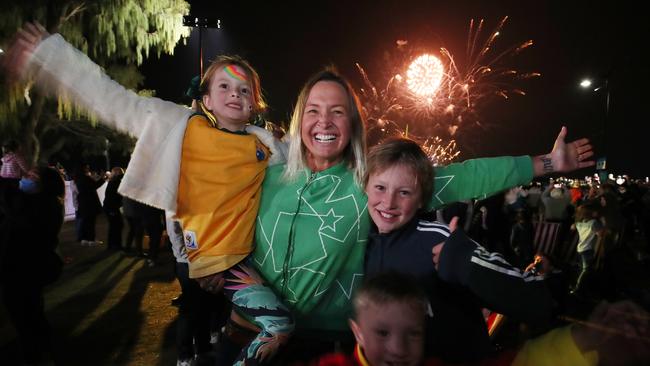
Australia has been elevated into the storied ranks of nations to host three Olympics with the announcement that Brisbane will anchor a new-look Games in 2032 to make the world’s greatest sporting event affordable.
International Olympics Committee president Thomas Bach set off a night of Covid-defying celebration across southeast Queensland as exultant crowds cheered a 40-year campaign to bring the Games to Brisbane.
“The Games of the 35th Olympiad are awarded to Brisbane, Australia,” Mr Bach declared, as green and gold-coloured fireworks lit up the city skyline. Thousands had packed riverside South Bank to ring in the news at 6.32pm on Wednesday.
A delighted Scott Morrison said the Games would be a “great ray of hope” for a nation gripped by the pandemic and enduring lockdowns in Sydney, Melbourne and South Australia.
“How good is Brisbane, how good is Queensland and how good is Australia? We’re just absolutely stoked about this,” the Prime Minister said.
Brisbane was in a one-horse race for the 2032 summer Olympics and Paralympics but until the very end there was concern that IOC delegates would postpone the vote, despite the presence in Tokyo of Queensland Premier Annastacia Palaszczuk, Australian Olympics boss John Coates and Brisbane lord mayor Adrian Schrinner to ice the $5bn bid.
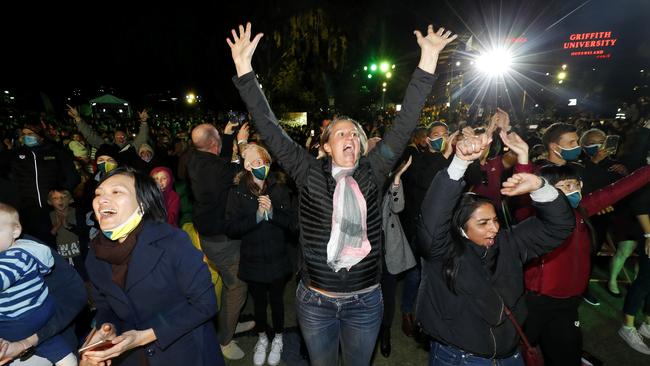
Only hours before the 80 IOC powerbrokers assembled on the eve of the Games’ opening in Japan, Olympics spokesman Mark Adams said the 2032 hosting rights were not a done deal and Brisbane could be put “back in the pot” with emergent rivals Qatar, Budapest, the two Koreas and the Rhine-Ruhr region of Germany.
The jitters disappeared when Mr Bach delivered the biggest boost to Australian sport since Sydney was named host of the 2000 Olympics 28 years ago. The vote was overwhelming for Brisbane, with 72 delegates in favour, five against and three abstaining.
Tokyo Games organising committee chair Hashimoto Seiko said: “My heartfelt congratulations go to the people of Brisbane and Australia.
“Over the past year, the world’s sporting community has faced the multiple challenges of Covid-19, however … the Olympic movement has made steady progress, culminating in today’s decision in favour of Brisbane.”
Mr Morrison added heft to the pitch, assuring IOC delegates by video link that planned infrastructure was fully funded between the federal and Queensland governments. The cash would flow as soon as the Brisbane-based bid was selected, he said.
Ms Palaszczuk said all three levels of government were committed to delivering public transport projects and venues in Brisbane, the Gold Coast and Sunshine Coast that would deliver a lasting dividend to Queensland’s southeast corner. “We want to show the world that mid-size cities and regions can host the Games without financial distress or missed deadlines,” she told IOC delegates. “The keys are long-term planning, bipartisan support and making the most of a city’s natural and built resources.”
Mr Schrinner, who burst into tears while rehearsing his speech to the IOC decision-makers, said the Brisbane Games would create a template for mid-size cities to host the Olympics.
“The model downsizes the budget but supersizes the Olympic experience, providing new hope for the Games,” he said.
Mr Coates, the architect of Brisbane’s unsuccessful bid for the 1992 Olympics that went to Barcelona and of the campaign that clinched them for Sydney, said 2032 would “future-proof” the Games by demonstrating they could be run at an affordable cost.
Asked how he felt about bringing the Olympics back to Australia, he said: “It’s the second contract I have signed, but it’s just as emotional.”
Brisbane joins Sydney and Melbourne in 1956 in hosting the Games, putting Australia behind only the US and equal with Britain and France in securing the showpiece event three times. The US tops the table with five summer Olympics, dating back to St Louis in 1904; the Covid-delayed Tokyo Games is the Japanese capital’s second after 1964.
Rocked by allegations of corruption in its selection processes and the crippling cost of hosting the Games for cities such as Montreal, Canada, in 1976 and Athens, Greece, in 2004, the IOC under Mr Bach introduced a “New Norm” to encourage bidders to make the most of existing sports facilities to drive down costs.
Ms Palaszczuk said 80 per cent of the proposed Games venues were already built while Mr Schrinner insisted that most of the $10bn in planned infrastructure, including a fast train link to the Sunshine Coast and Brisbane’s Metro electric busway system, would have been built regardless of the outcome of the Games bid.
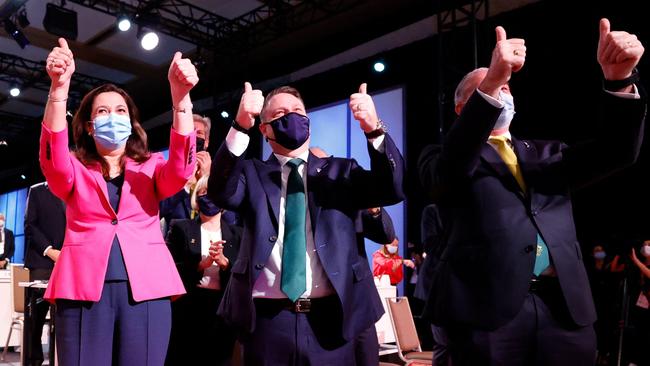
Mr Morrison affirmed that the federal government would split the operating cost 50-50 with Queensland, a big advance on the $150m Canberra put towards the Sydney Olympics.
At $5bn, the cost of the Brisbane Games would be less than one-quarter of what the Japanese have spent on staging the 2020 Olympics a year late because of Covid, according to estimates presented to the IOC delegates.
Former Olympic swimmer Mark Stockwell, a medallist at the 2004 Los Angeles Games who joined the party at South Bank after working behind the scenes on the 2032 bid, said the changes to the IOC rules got the Brisbane bid across the line. “I can tell you, I’m excited … this will lead to a decade of improvements, a decade of actually focusing on those pathways for athletes and lead to us being a major medal winner in 2032,” he said.
“Madame Butterfly” Susie O’Neill, who capped a glittering career in the pool by winning gold at the Sydney Olympics, was just 20 when those Games were announced. The opportunity to compete at home pushed her to train harder, she said. “I remember thinking, ‘I hope I am still swimming at 27’, because back then that was considered old,” she told The Australian.
“The only reason I held on for another seven years was because I wanted the chance to compete in Sydney. To have the Games on home soil and your countrymen cheering you on is so special.”
Echoing her hero in the happy throng at South Bank, 11-year-old Maggie Gray said she hoped to compete in her own hometown Games in 11 years. “I’d like to get in a few before that, in Paris and Los Angeles, but it would be pretty amazing to compete at a home Olympics,” the little girl said.
Former Brisbane lord mayor Graham Quirk, who in 2015 acted on an idea by The Australian’s veteran Olympics writer Wayne Smith to go after the Games, said they would provide “tremendous opportunities that many will never fully appreciate”, including business investment and better infrastructure.
Additional reporting: Jacquelin Magnay, Lydia Lynch, Mackenzie Scott



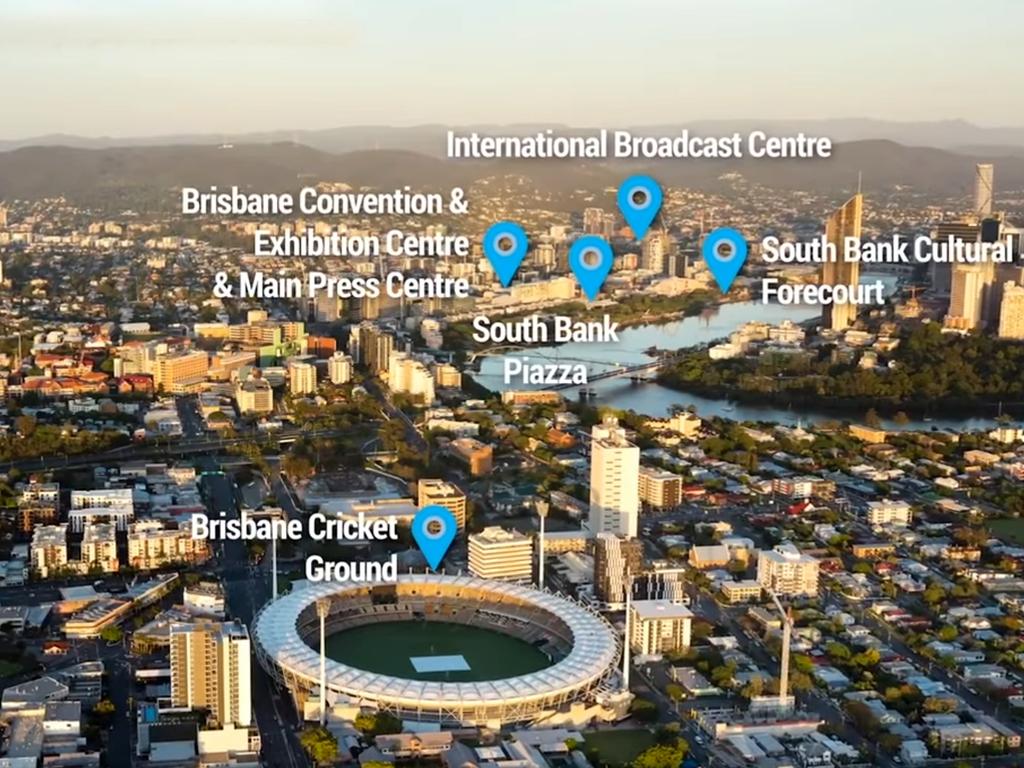
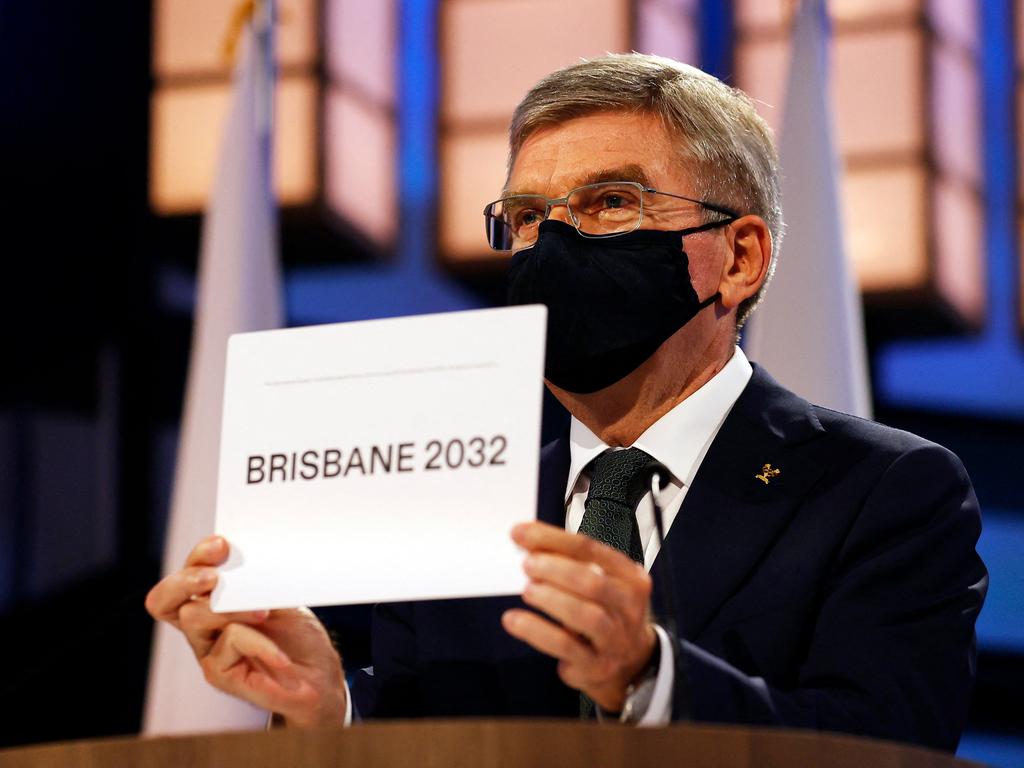



To join the conversation, please log in. Don't have an account? Register
Join the conversation, you are commenting as Logout